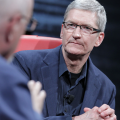Just before the March of a Million protesters converged on Tahrir Square in Cairo on Feb. 1, word of a game-changing online software program spread like a secret handshake among renegade computer users.
The free program, developed in Mountain View, allowed government critics to access news and social media sites, including Facebook and Twitter, without fear of government eavesdropping. With the tools, a virtual army of marginalized men, women and children transformed itself into a force so strong that crooked President Hosni Mubarak had no choice but to abandon the presidential palace for a Red Sea resort.
Hotspot Shield, which assigns users an anonymous American IP address, had become a conduit between closed societies and the free and open World Wide Web. Essentially giving individuals the kind of virtual private network (VPN) that companies have relied on for years to protect their data as it traveled across public networks, the download-able program protected communications from snoopy government packet sniffers that are used to spy on Internet traffic in many countries.
It helped provide a perfect storm of technology, allowing modern revolutionaries to access a toolkit that included Facebook Events (to invite people to rallies), Twitter (for military-style logistical communication) and YouTube (to disseminate moving images that influenced public opinion).
As the wave of revolution surged eastward, the numbers of Shield users spiked.
At the Tunisian unrest’s apex in December, 175,000 people used the program each day. Next came Egypt, where roughly 120,000 people deployed the Shield to access the Internet on Jan. 1. Before the month had ended, more than a million Egyptians were using the Shield to protect their identities as they plotted their moves.
By the time Mubarak hit the kill switch on the country’s Internet on Jan. 28, it was too late. The imperative for change had echoed beyond the Twittersphere and into the street. The Arab Spring was on its way.
The company behind the Hotspot Shield, AnchorFree, was created by 29-year-old co-founders David Gorodyansky and Eugene Malobrodsky, who have been friends since childhood. Wanting to give web surfers secure Internet connections, as well as protect user identities when logging on with passwords or other sensitive information, Hotspot Shield filled an untapped market. Since that time, the program has shown that idealism and making money are not mutually exclusive.
Libya also saw numbers trend sharply upward, from 6,400 people as of Feb. 1 to more than 42,000 by the end of the month. Actions by Col. Muammar Gaddafi’s forces to shut down the Internet throughout the region have since stifled AnchorFree’s progress, but not completely.
One feature of Hotspot Shield is that it allows AnchorFree to monitor traffic patterns. “We can see at night that the Libyan government is shutting down the Internet during the day by looking at our traffic,” Gorodyansky says. “We know in the Middle East when people are eating, when people are praying and when people are sleeping. We have a complete overview of what’s happening in different parts of the world at any time.”
{pagebreak}
Unlike traditional proxy servers—websites that allow users to access the Internet anonymously—Hotspot Shield encrypts the connection between the user and the proxy server, which then communicates with the server delivering the content. More than 9 million users are now accessing the Internet through the Shield, the majority of them residing in nations with restrictive rules about Internet use.
Let My People Post
At 29, David Gorodyansky looks like a man who has spent more time toiling under fluorescent tubes than in the sunlight. His hair is jet black and matches his signature black sport coat, as well as the dark circles below his eyes. His eyes say: “I have been working longer and harder than you, and when will this interview be over, because I need to get back to the office?”
Gorodyansky also has the quick grin of a man who is passionate about what he does and can see the horizon. His confidence has grown in recent years, as he and his best friend, Malobrodsky, the taller and stouter co-founder of AnchorFree, have created their second successful startup company while still in their 20s. The men were successful entrepreneurs before they could order a drink, after forming a company specializing in wholesale retail of IT equipment while in college.
“I was maxing out credit cards, borrowing money from various friends and families, and it all worked out fine,” Malobrodsky says. “It was a hustle, because it was always about taking a risk.”
The risk paid off. In just two years, Malobrodsky and Gorodyansky, still studying full time at the University of San Francisco and San Jose State University, respectively, made the company prosper to the point that it was bringing in $1 million in annual revenue. By 2005, both dropped out of school a couple credits short of graduation to pursue a new business venture.
“With a little bit of money, we wanted to do something fun and different, and we became interested in consumer privacy,” Gorodyansky says. “We wanted to come up with a concept where privacy and security could work together with advertising, so ads could still be targeted based on user interest, but nobody knows who the user is.”
With the help of childhood friend Dimitry Gavrilov, an engineer, the pair founded AnchorFree. They constructed a software program with simple but substantial aspirations. Most jobs have their redeeming moments, Gorodyansky says, but there is something far more invigorating when one’s work not only serves a functional purpose but also changes the world.
“It’s great that we have got a profitable, fast-growing tech company in the valley, but it’s also really cool that there’s a real social impact,” he says. In contrast, he points to Zynga, the free gaming company that is responsible for Facebook walls worldwide showing just how much time people spend building imaginary farms.
“It’s a cool company,” Gorodyansky says, “but they sell virtual cows or goats. They are not having any real social impact.”
{pagebreak}
When AnchorFree was getting off the ground, the two founders’ weekly hours surpassed triple digits. Complementing each other, Malobrodsky handled IT and infrastructure logistics, while Gorodyansky became the face and voice of the company. In just three months of trying to attract angel investors—which resulted in $6 million of venture funding—Gorodyansky flew from San Francisco to New York and back 35 times. Relationships for both men were strained, and their anxiety about the possiblity of the company failing was constant. Malobrodsky, who has a 2-year-old daughter, barely saw his wife, and when he was home he was working. Gorodyansky, who has a long-time girlfriend, faced similar pressures.
“Of course, it’s difficult, because when you have 100 things going on in your head it’s hard to be a normal human being,” he says. “It’s not like working at a regular company. You always feel like something is going to go wrong.”
Greg Coleman, formerly the president of Huffington Post after serving as the lead global sales executive for AOL and Yahoo, invested in AnchorFree and joined its advisory board in the second year of the company’s existence. Getting him to come aboard was no easy task. Cocktail waitresses with $5,000 breast implants get solicited less than Coleman does to guide startup companies. But he knew after studying AnchorFree’s analytics and meeting with Gorodyansky that the company had a unique vision.
“When I met David, he was 24,” says Coleman, who is joined on the board by former MCI chairman Bert Roberts as well as Silicon Valley icon Esther Dyson. “He had an incredible early business sense, but his sense was mostly around the technology and surrounding himself with some good people.”
It wasn’t long, Coleman says, until he became aware that Gorodyansky’s ability to identify good ideas and talented people was exceeded by his drive. “He’s always working—always. He’s too much. I’ll get emails from him over the weekend, and I’ll say, ‘Go out, get a date, have a drink, chill out. He’s very driven; he’s always on. He’s always an entrepreneur.”
“When we started, it basically took over our lives, and that’s all we did, but it was always fun,” Gorodyansky says. “I read a quote the other day: ‘A real entrepreneur is someone who steals supplies from home and brings them to his office.’” He stops and smiles wryly, as if his apartment in San Francisco has the look that it’s just been looted.
That whatever-it-takes mentality was fostered in both men from a young age. Gorodyansky moved to Palo Alto when he was 9, coming with his parents and sister from Moscow. Malobrodsky arrived a few years later by way of Kaunas, Lithuania. Both come from parents who are engineers, and neither spoke a word of English upon arriving in California. Meeting at Hebrew school, they became friends and followed the industrious model set by their parents: work, study and enjoy yourself, which for this pair meant playing chess or conducting science experiments in their spare time.
“Me and David were always earning our own money,” Malobrodsky says. “We didn’t get money from our parents like kids nowadays. Everything is given to them. We actually had to earn it and learn what it takes to get what you have. That’s probably part of our culture.”
It’s not a coincidence that foundation is also rooted in the culture of Silicon Valley.
{pagebreak}
Porous Boundaries
The websites a person looks at know more about the user than the user can ascertain from the screen. Every Internet user is creating a trail of information about their activity, and privacy advocates are troubled by the way those informational footprints are being used.
Lawmakers in Washington, D.C., with the advice of the Federal Trade Commission, are crafting legislation to help consumers protect their identities. It’s unclear how much revenue would be lost if information about the Internet sites people visit, as well demographic metrics, are shielded from advertisers. But companies like Google, Yahoo and Amazon will surely fight to maintain access to those records.
AnchorFree’s niche is in the compromise it offers. Users receive their free proxy IP address in return for a banner ad that appears on each site they visit (which can be closed with the click of a button) and a toolbar that contains other sponsored applications. Their online identities are not available to the websites they visit—nor to AnchorFree itself.
The trail still exists, and advertisers who work with AnchorFree can continue to target ads based on that information, but there is no exchanging of names, IP addresses or other identifiers. (AnchorFree, a private corporation, declined to release its revenue numbers.)
And yet there is a limit to AnchorFree’s knowledge. Hotspot Shield was specifically programmed to toss out that information upon connection, the company says, while retaining information about its users’ location.
“If somebody came to us and said, ‘We’ll give you a billion dollars for information on just this one person,’ we simply don’t have it,” Gorodyansky says.
That’s an important factor for the future of AnchorFree, and one appreciated by its users.
U.S. Congresswoman Anna Eshoo met with Gorodyansky and Malobrodsky in January when she was researching “do-not-track” legislation, which would prevent advertisers from recording users’ online activities. She found, as is often the case, that the government is more than a few steps behind the private sector.
“Personal privacy is a closely held American value,” says Eshoo, who was formerly the chairwoman of the Subcommittee on Intelligence Community Management. “I think it’s in our DNA. We don’t want the government having a lot of information about us. We have a healthy skepticism about it, and when it comes to the Internet, it’s in some ways like the Wild West, a new frontier.”
AnchorFree’s ability to recognize this before anyone else has positioned the company in a way that seems staggeringly ambitious. With 9 million users currently, Gorodyansky’s goal is to pass 100 million users in just three years. With 2 billion people on the Internet, the company identifies three-quarters of those people as its market.
Enticing individuals within these borders, as well those in nations besieged by authoritarian regimes, is the only way to achieve that goal.
“The bulk of the users are in the Middle East, which is not your bastion of targeted users,” says Coleman with a chuckle. “I never believed David would be able to get 10 million in this period of time. But it’s a geometric growth pattern. If it’s 100 million by when, I don’t know, but he’s surpassed my expectations by traffic growth.”
And that seems to be the point: a partnership of business, where the bottom line and a social need run parallel. Gorodyansky rarely misses an opportunity to bring up his idol, microbanking pioneer Muhammad Yunus. In his own way, he is trying to follow that path.
“We never had the thought, ‘Hey, we’re going to disrupt censorship around the world,’” Gorodyansky says. “But we did have a thought that once we do this and make it successful, the next thing we’re going to do will be geared more toward social impact vs. making money. The fact that we can do both now is awesome.”

 Twist and Shout: Beatles Tribute
Twist and Shout: Beatles Tribute 








